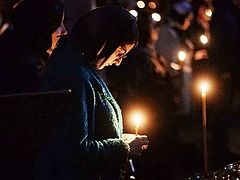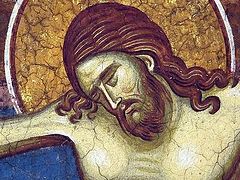 James Tissot (French, 1836-1902). With Passover Approaching, Jesus Goes Up to Jerusalem, 1886-1894.
James Tissot (French, 1836-1902). With Passover Approaching, Jesus Goes Up to Jerusalem, 1886-1894.
Today with God’s help I will continue yesterday’s unfinished homily on the way of the cross that awaits the disciples and followers of Christ during the days of Passion Week.
The Lord said to the apostles two days before the Passover, Behold, we go up to Jerusalem; and the Son of man shall be betrayed unto the chief priests and unto the scribes, and they shall condemn him to death, and shall deliver him to the Gentiles to mock, and to scourge, and to crucify him (Matt. 20: 17–18). In the last of these words the Savior expresses deep sorrow. This sorrow, like heavy chains, became more and more painful with each passing minute and each minute aroused greater suffering. Sadness after sadness strikes the heart of the Redeemer, Who is nearing His voluntary suffering. Many of these sorrows await the faithful also on their life’s path. Those of the faithful whose souls respond to the thought of the cross, in spirit carry this cross, woven from bitterness and troubles.
The Savior’s deep sorrows came even before He was betrayed into the hands of sinners. The Gospel tells us that a few days before the feast of the Passover, when all were preparing for the joyous general solemnities as for the time when a person drops the burden of his worries and cares, public and daily, and gives himself over to quiet rest, the Savior received the sorrowful news of his friend Lazarus’s illness. The death of this friend brought Him to tears. He wept over the grave. At the threshold of His sufferings on the cross came tears over his lost friend. Who of us have not had to shed such tears? Who of us has not wept over the grave of a friend, when the consolation of mutual pleasure is taken away? This is a frightful test of all the powers and abilities of the soul. Orphanhood is terrible. No one can look without compassion at the tears of widowed mothers, widowed spouses, children who have lost their fathers, friends taken away from us by a fatal, dumb sentence that is subject to neither judge, nor any appeal to death. Here every word of consolation is no more than empty noise. Here only tears are possible. If the Savior bedewed his friend’s grave with tears, then by this means He eased our own loss as well. Let all who are orphaned ease their way of the cross, the way of abandoned loneliness and tears. From a tear grows consolation; the great sorrow of orphanhood and helplessness cleanses with a pure stream our dedication to God’s will, without which not a hair falls from a man’s head.
Further, the Gospel tells us about Christ the Redeemer. He went to Jerusalem and without entering the capital city, looked down at that city from the Mount of Olives. His disciples were admiring the city’s picturesque locale, the bustle of life in the festive town, its superlative, strong buildings, the millions of people rambling around the town, who had arrived from all over to Jerusalem for the feast. What evoked joy in the disciples evoked bitter feelings in the Savior. He wept over the future of this city, over which the sword of punishment was already hanging—destruction and dispersion. The Savior could see that Jerusalem would collapse beneath the ruins of its impiousness. No stone will be left upon the other to testify to its former grandeur. And this oppressive feeling of sorrow is inconsolable—it always meets the true cross-bearers of all times. For us this feeling passes not to Jerusalem, not to a city, not to a kingdom or state, but to our own families and the families of those close to us. How often can we see the decline, desolation, and dispersion of families that have forgotten God’s commandments, who have renounced the testaments of their fathers and mothers. Seeing clearly the disconsolate future of a disobedient son, a badly raised daughter, or an ignoble friend is a terrible sorrow. All of us are one way or another bound by familial bonds. And if we notice in this regard the weakening of the threads that hold families together, involuntary horror overtakes the soul at the mere thought of how this thread will break. When the thread of moral relationships between close ones breaks, the joy of earthly life breaks along with it—bitterness, dispersion, and desolation. The abomination of desolation comes to the holy place, as the prophet said.
Further the Gospel tells us that Christ came to the temple of God in Jerusalem. Here He found such outrage, such greed that the temple on one side resembled a noisy market square and on the other a den of thieves. The Savior’s feelings were stricken by such an outrage. Even His meek soul was enraged at such an abomination in the house of God.
Even though we are disciples of the Savior, we are little disturbed by this sadness. We are used to bad customs. We ourselves are even so disposed that these customs might multiply. Many of us facilitate this. But these “many” are not cross-bearers.
Desperate is the state of the nation whose temples have lost the right to be called houses of prayer and piety. There society falls apart and its spiritual vitality decays. A pretentious, money-grubbing, lazy priest and an inattentive, distracted, and dissolute layperson merge into one. Their lips do not call out for God’s grace, but their corrupt hearts make God’s wrath not slow to come. May God save us from multiplying the number of blasphemers and servants of idols. Let us enter with Christ into the temple He has purged. We shall be reverent in it. Amen.



